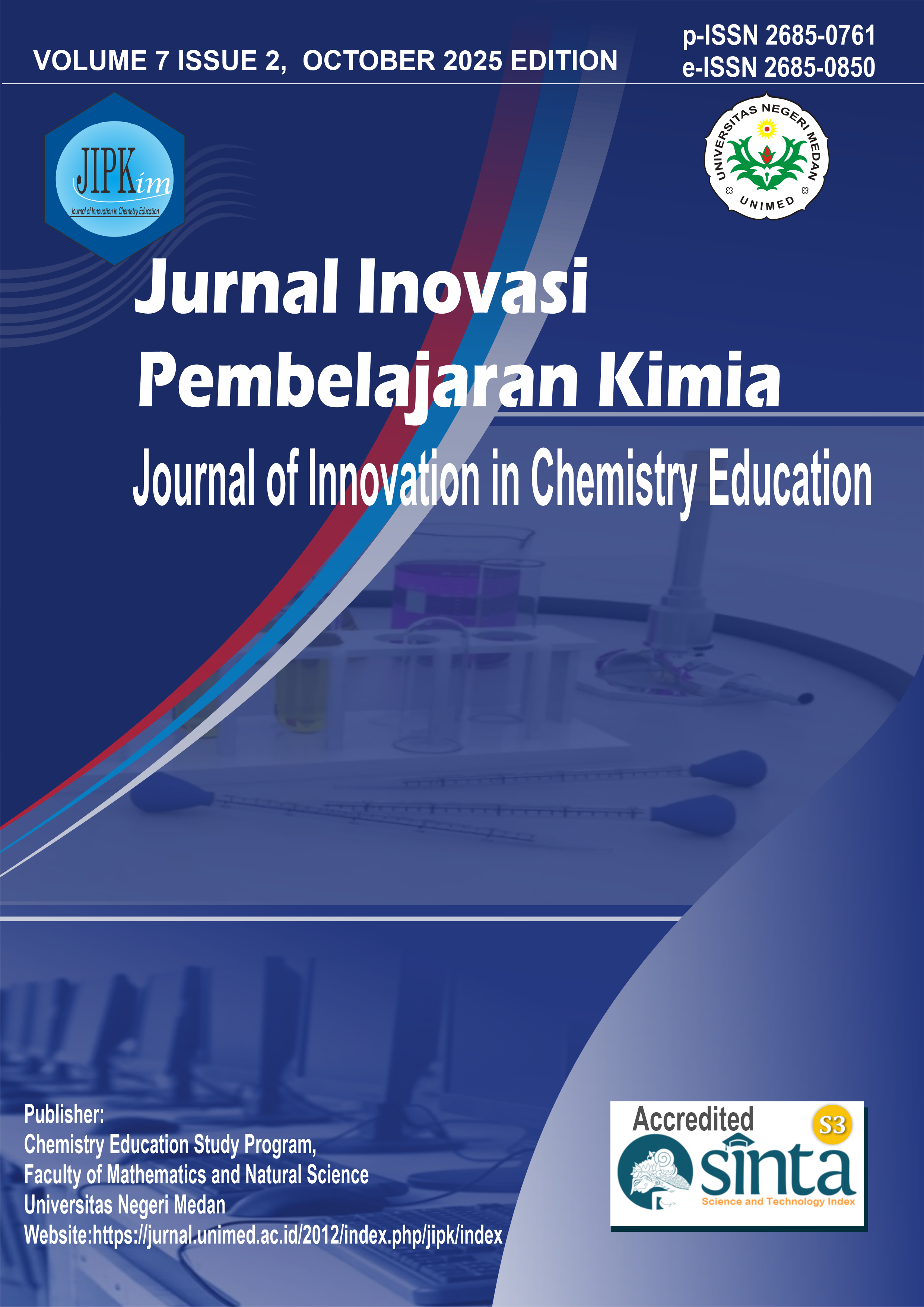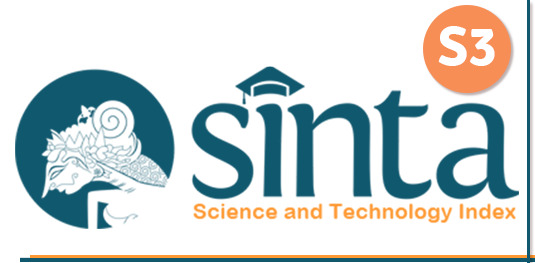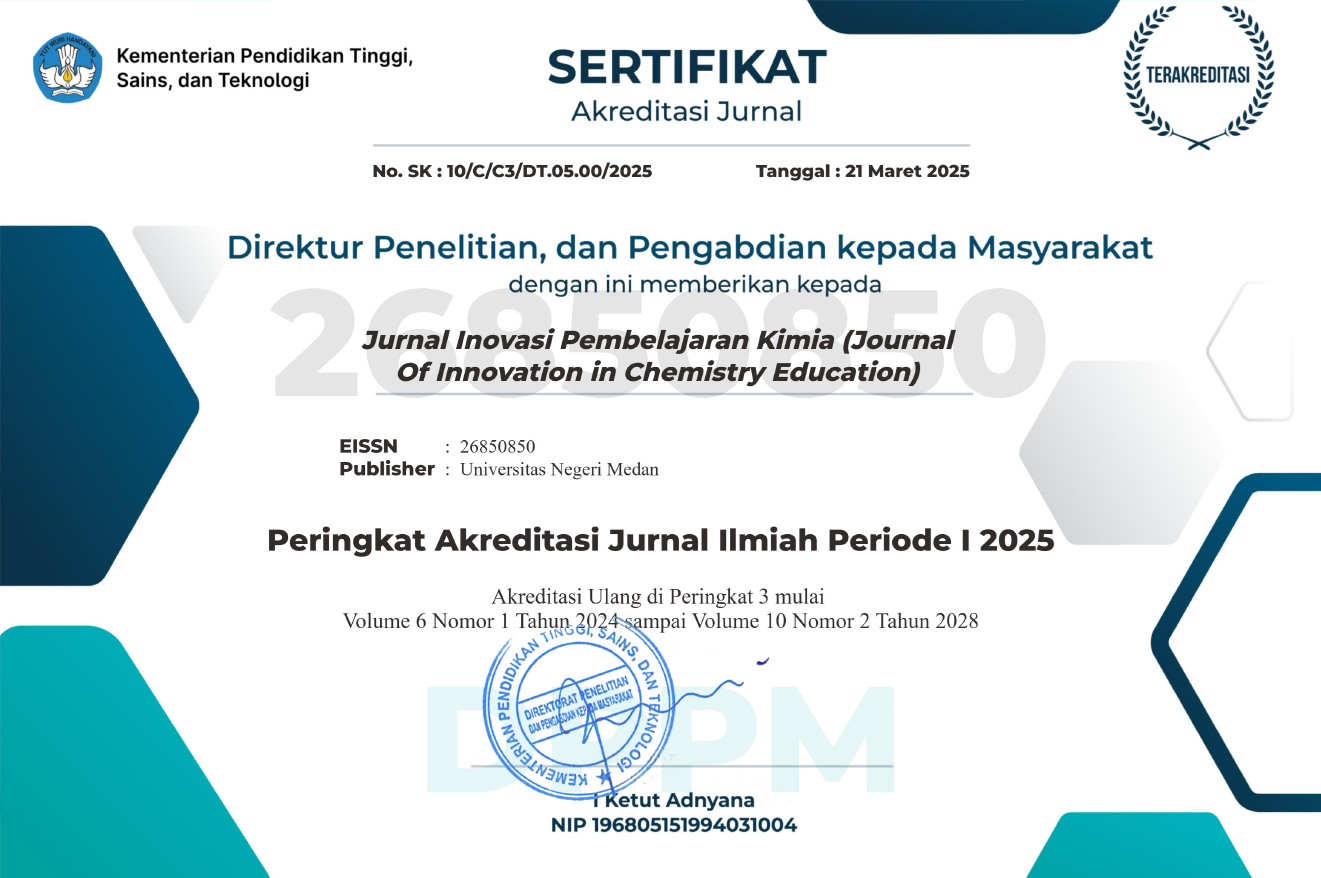Analysis and Training of Innovative Learning through the Use of the Irydium Application in Basic Chemistry Practicum
DOI:
https://doi.org/10.24114/jipk.v7i2.69600Keywords:
Irydium Application, Basic Chemistry Practicum, School Field IntroductionAbstract
The development of technology in education, particularly in chemistry education, demands innovation in laboratory activities to enhance their effectiveness and efficiency. One such innovation is the Irydium Application, a digital-based platform for basic chemistry practicum. This study aims to determine the effectiveness of using the Irydium Application among students of the Chemistry Education Study Program who have completed the School Field Introduction Program (Pengenalan Lapangan Persekolahan/PLP). The research began with a training session on the use of the Irydium Application prior to data collection. A descriptive qualitative method was employed, with data collected through interviews, surveys, and observations to obtain a comprehensive understanding of the changes and impacts associated with the application’s use in basic chemistry practicum activities. The results show that the Irydium Application is highly needed by PLP students to support laboratory practices in schools. However, students were only introduced to this application after the training. Students also agreed that the Irydium Application is easy to install and operate, and it can significantly enhance the effectiveness of chemistry practicum activities in schools. Therefore, the integration of the Irydium Application can serve as an innovative and technology-based approach to improving chemistry learning and practicum experiences.References
Andriawati, D. (2025). Penerapan pembelajaran inkuiri berbantuan Irydium Chemistry Lab untuk mengembangkan kemampuan berpikir tingkat tinggi siswa pada materi stoikiometri larutan [undergraduate thesis, UIN Sunan Gunung Djati Bandung]. UIN Sunan Gunung Djati Bandung Institutional Repository. https://digilib.uinsgd.ac.id/id/eprint/119450
Bazie, H., Lemma, B., Workneh, A., & Estifanos, A. (2024). The effect of virtual laboratories on the academic achievement of undergraduate chemistry students: A quasi-experimental study. JMIR Formative Research, 8, Article e64476. https://doi.org/10.2196/64476
Chan, P., Van Gerven, T., Dubois, J.-L., & Bernaerts, K. (2021). Virtual chemical laboratories: A systematic literature review of research, technologies and instructional design. Computers & Education Open, 2, 100000. https://doi.org/10.1016/j.caeo.2021.100000
Chang, R., & Goldsby, K. A. (2016). Chemistry (12th ed.). McGraw-Hill Education.
Guruloo, T. N. M., & Osman, K. (2023). Integrating virtual reality laboratories (VRLs) in chemistry education: A systematic literature review. International Journal of Education, 15(4), Article 21372. https://doi.org/10.1234/ije.21372
Hofstein, A., & Lunetta, V. N. (2004). The laboratory in science education: Foundations for the twenty-first century. Science Education, 88(1), 28–54. https://doi.org/10.1002/sce.10106
James, H., & Honeychurch, K. C. (2024). Digital image colorimetry smartphone determination of acetaminophen. Journal of Chemical Education, 101(1), 187–196. https://doi.org/10.1021/acs.jchemed.3c00621
Kuhl, D. P. (2016). Laboratory experiments for chemistry. McGraw-Hill Education.
Puspasari, D. A. (2025). Pengaruh model pembelajaran problem based learning berbantuan media IrYdium Chem Lab terhadap kemampuan berpikir kritis dan hasil belajar siswa kelas XI [undergraduate thesis, Universitas Sebelas Maret]. Universitas Sebelas Maret Institutional Repository. https://digilib.uns.ac.id
Spies, J. R., et al. (2024). Ten simple rules for implementing electronic lab notebooks (ELNs). PLOS Computational Biology, 20(4), e101234. https://doi.org/10.1371/journal.pcbi.101234
Sudjana, N. (2017). Dasar-dasar proses belajar mengajar. Sinar Baru Algensindo.
Tay, K. S., & Eng, J. L. (2024). Integrating maker education into the research project of undergraduate chemistry program: Low-cost Arduino-based 3D printed autotitrator. Journal of Chemical Education, 101(12), 5430–5436. https://doi.org/10.1021/acs.jchemed.4c00641
Uzani, H. D., Al Idrus, S. W. ., & Anwar, Y. A. S. . (2023). Pengembangan Modul Praktikum Virtual Berbasis Keterampilan Berpikir Kritis Pada Materi Asam Basa. Chemistry Education Practice, 6(1), 101–107. https://doi.org/10.29303/cep.v6i1.4262













